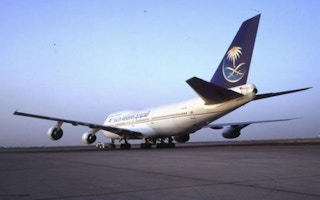Saudi Arabia ordered its national airline not to comply with European Union emissions-trading rules in protest against the bloc’s decision to include non-EU carriers in its carbon market, two people with knowledge of the matter said.
The kingdom, OPEC’s biggest oil producer, has notified the 27-member bloc of the decision and discussions are ongoing to reach a compromise, said the people, who declined to be identified because the information isn’t public. Khalid al- Khaibary, a spokesman for the civil aviation authority in Jeddah, Saudi Arabia, declined to comment when reached by phone yesterday.
Saudi Arabia was one of the countries including the US, China, and India that issued a joint statement in February opposing the EU law, which obliges airlines flying into and out of the bloc to report the carbon-dioxide pollution from their flights and surrender EU permits matching those emissions every year starting in 2012.
“The EU thinks that, with time, the charges levied on us will become normal and acceptable. We wanted to make sure to send them a message that the case will not end easily,” Mohammed al-Sabban, an independent energy consultant and a former Saudi chief climate negotiator who represented the country in issuing the joint communique, said Sept. 28 by phone. State-owned Saudi Arabian Airlines is the only Saudi-based carrier that travels to Europe.
Jeddah meeting
Officials from the group of 29 nations who signed the communique may gather early next year in Jeddah to follow up on earlier meetings, one of the people said.
The inclusion of airlines in the EU emissions trading system is a unilateral action taken outside the United Nation Framework Convention on Climate Change, al-Sabban said in an interview from Jeddah. Most Arab countries, as well as US, Canada, China, India, and Russia, hold views similar to those of Saudi Arabia, he said.
The EU, which wants to lead the global battle against climate change, decided in 2008 that airlines will become part of its cap-and-trade system after a decade of inaction by international organizations. The bloc has said that its aim is to reach a global solution to tackle greenhouse gases from aviation and that its emissions trading rules don’t breach international laws.
The EU law, which enables the exemption of incoming flights from a country if that nation implements equivalent measures to tackle pollution from the industry, has been critizised by non- EU carriers and governments. The UN International Civil Aviation Organization has said it’s in the best position to regulate emissions from carriers.
Airbus, Lufthansa
Airbus and eight airlines including Air France-KLM Group and Deutsche Lufthansa AG, said in a joint letter sent in March to the governments of France, Germany, Spain, and the United Kingdom that the inclusion of airlines created an “intolerable” situation and urged the governments to find a compromise.
“I think the EU ETS will get solved by China and India not buying any Airbus airplanes,” Delta Air Lines Chief Executive Officer Richard Anderson said today at a cargo symposium in Atlanta hosted by The International Air Cargo Association.
The US Senate passed draft legislation last month that would prohibit its carriers from complying with the EU emissions trading program. Airlines including United Continental Holdings Inc., Delta and American Airlines owner AMR, have objected to being included in the emissions-trading system.
Obama
The Senate bill, supported by the airlines, must be reconciled with similar legislation passed by the US House of Representatives last year. The Obama administration hasn’t decided on the bill and Transportation Secretary Ray LaHood said in June the government “strongly opposes” the EU plan.
Saudi Arabia still hopes the EU will reconsider its system once “it seems very clear that other countries, developed as well as developing, will not tolerate this unilateral step that may initiate retaliation from these countries as well as from others,” said al-Sabban, also a former senior economic adviser in the ministry of petroleum and mineral resources. The countries opposing the EU’s measure support ICAO efforts to build a global agreement on combating climate change, he said. An official at the Jeddah-based press office for Saudi Arabian Airlines declined to comment on Sept. 30 when reached by phone.
Airlines in the European cap-and-trade program will this year receive free-of-charge emissions permits equivalent to about 85 percent of their historical emissions, according to EU laws governing the market. Aircraft operators have to surrender EU or United Nations emission permits against their 2012 emissions in April 2013.
The European Commission, the EU regulatory arm, said in May that most international airlines, including Saudi aircraft operators, complied with the first reporting requirement to submit CO2 data for 2011. The only carriers that failed to inform the EU about their emissions were eight airlines in China and two in India, according to the commission.










